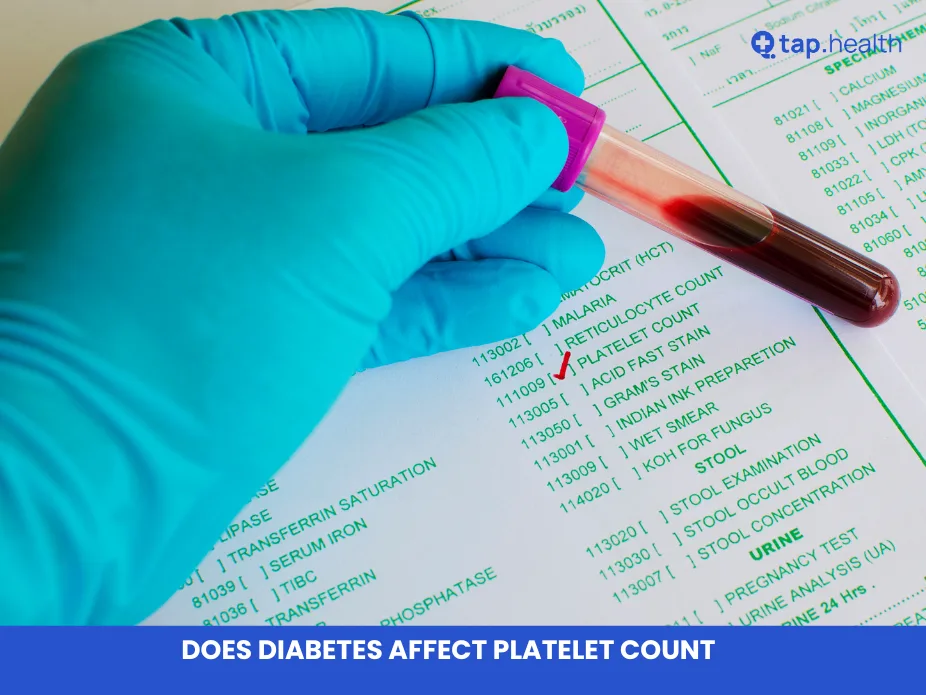If you have diabetes, you might already be aware of how it impacts your blood sugar levels, but did you know it can also affect your platelet count? Platelets, tiny cells in your blood, play a crucial role in clotting and healing wounds. Diabetes can alter their function, increasing the risk of bleeding disorders, blood clots, and other complications.
In this blog, we’ll break down how diabetes affects platelet count, the risks involved, and ways to manage it effectively.
What Are Platelets and Why Are They Important?
Platelets, also called thrombocytes, are small blood cells that help with clotting when you get a cut or injury. They stop excessive bleeding by forming clots at the injury site.
A normal platelet count ranges between 150,000 to 450,000 platelets per microliter of blood. If your platelet count is too low (thrombocytopenia), you may experience excessive bleeding. If it’s too high (thrombocytosis), it can lead to dangerous blood clots.
How Does Diabetes Affect Platelet Count?
Diabetes can impact your platelet count and function in several ways:
- Increased Platelet Activation
- High blood sugar levels can make platelets “stickier,” increasing the risk of blood clots and cardiovascular problems.
- Inflammation and Blood Vessel Damage
- Chronic inflammation from diabetes can cause vascular complications, affecting platelet production and function.
- Insulin Resistance Impact
- Insulin resistance, common in type 2 diabetes, can lead to platelet dysfunction, making clot formation less effective.
- Complications of Diabetic Conditions
- People with poorly managed diabetes may experience blood disorders, poor circulation, and delayed wound healing, all linked to platelet abnormalities.
Signs and Symptoms of Platelet Issues in Diabetes
If diabetes is affecting your platelet count, you might notice symptoms such as:
- Easy bruising – Even minor bumps may cause large bruises.
- Frequent nosebleeds – Unexplained bleeding from the nose or gums.
- Delayed wound healing – Cuts or injuries take longer to heal.
- Tingling or numbness – Poor circulation in hands and feet due to clotting issues.
- Unusual fatigue – Low platelet counts can lead to anemia-like symptoms.
Real-Life Scenarios
Let’s take an example to understand how diabetes and platelet issues affect daily life.
Meet Sunita, a 50-year-old homemaker from Mumbai.
Sunita was diagnosed with type 2 diabetes five years ago. Recently, she noticed that even small cuts took longer to heal, and she bruised easily. Concerned, she visited her doctor, who recommended a platelet count test. The results showed mild thrombocytosis, meaning she had a higher platelet count, increasing her risk of blood clots.
With dietary changes, better diabetes management, and regular check-ups, Sunita successfully maintained healthy blood sugar and platelet levels.
Her experience highlights the importance of early detection and lifestyle modifications.
How to Manage Platelet Health with Diabetes
Taking proactive steps can help you manage your platelet count and reduce complications. Here are some key strategies:
1. Maintain Healthy Blood Sugar Levels
Keeping blood sugar levels stable helps reduce inflammation and platelet activation.
Tips:
- Monitor glucose levels regularly.
- Follow a diabetes-friendly diet with low-glycemic foods.
- Take medications as prescribed by your doctor.
2. Eat Foods That Support Platelet Health
Include nutrient-rich foods to support healthy blood and platelet function.
Best foods for platelets:
- Leafy greens (spinach, kale) – Rich in vitamin K for blood clotting.
- Citrus fruits – Provide vitamin C, which helps platelet function.
- Omega-3-rich foods (fish, flaxseeds) – Help prevent excessive clotting.
- Whole grains – Improve overall heart and blood vessel health.
3. Stay Physically Active
Exercise promotes healthy circulation and reduces the risk of blood clots.
Try:
- Brisk walking
- Yoga
- Strength training
4. Avoid Smoking and Alcohol
Smoking and excessive alcohol consumption can impair platelet function and worsen diabetes-related complications.
5. Regular Health Check-Ups
Routine blood tests can help track platelet counts and detect issues early.
Expert Contributions
Dr. Ravi Sharma, a leading diabetologist from Delhi, shares,
“Many diabetics overlook the importance of blood health. Monitoring platelet function regularly can help prevent major complications like heart disease and strokes.”
Dr. Sharma recommends that diabetic patients undergo routine blood tests and work closely with their healthcare providers to optimize their health.
(Reference: Indian Journal of Medical Research)
Recommendations Grounded in Proven Research and Facts
Research-backed strategies to maintain healthy platelets in diabetes include:
- Hydration is Key
- Drinking plenty of water keeps blood viscosity in check, preventing clot formation.
- Limit Processed Foods
- Processed foods high in sugar and unhealthy fats can worsen inflammation and impair platelet function.
- Consider Natural Supplements
- Omega-3 supplements and vitamin E may help support blood health but should be taken under medical supervision.
- Manage Stress
- Stress increases inflammation and affects platelet activity, so focus on relaxation techniques like meditation.
Factual and Reliable Information
For reliable information on diabetes and platelet health, refer to these trusted sources:
- American Diabetes Association: www.diabetes.org
- Centers for Disease Control and Prevention (CDC): www.cdc.gov
- National Institute of Diabetes and Digestive and Kidney Diseases (NIDDK): www.niddk.nih.gov
Frequently Asked Questions (FAQs) on Does Diabetes Affect Platelet Count?
1. Can diabetes cause low platelet counts?
Yes, poorly managed diabetes can lead to low platelet counts, increasing the risk of excessive bleeding and poor wound healing.
2. How often should diabetics check their platelet count?
It’s recommended to have routine blood tests at least once a year or as advised by your doctor.
3. Does high blood sugar affect platelet function?
Yes, high blood sugar can make platelets more prone to clotting, which increases the risk of heart attacks and strokes.
4. What foods should diabetics avoid to maintain healthy platelets?
Diabetics should avoid fried foods, sugary snacks, and processed meats, as they can worsen inflammation and blood vessel health.
5. Can platelet issues in diabetes be reversed?
With proper blood sugar management, lifestyle changes, and medical support, platelet-related complications can often be controlled or improved.
Conclusion
So, does diabetes affect platelet count? Absolutely. Diabetes can impact your platelet count and function, increasing the risk of bleeding disorders and blood clots. However, by managing your blood sugar levels, eating a healthy diet, and staying active, you can maintain good blood health and prevent complications.
If you notice unusual bleeding or bruising, consult your doctor for a platelet count test and take proactive steps to stay healthy.



